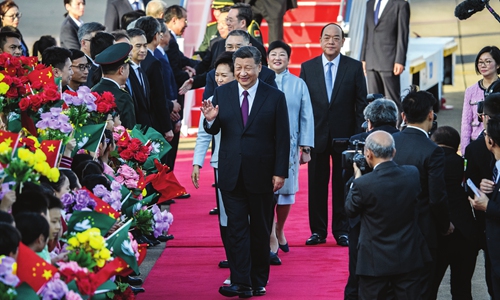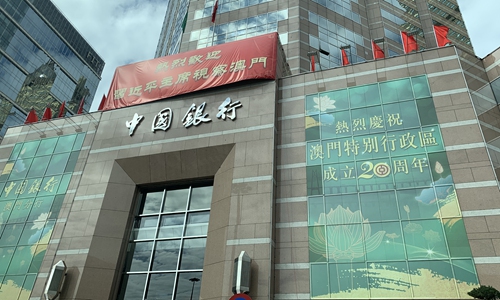HOME >> CHINA,SPECIAL-COVERAGE
Xi hails Macao’s prosperity
By Chen Qingqing, Bai Yunyi in Macao and Hu Yuwei in Beijing Source:Global Times Published: 2019/12/18 23:48:54 Last Updated: 2019/12/19 0:46:15

Chinese President Xi Jinping (front C) and his wife Peng Liyuan (behind Xi) walk on the red carpet in front of outgoing Macao Chief Executive Fernando Chui (C) and incoming chief executive Ho Iat Seng (blue tie) after Xi and his wife's arrival at the Macau International Airport in Macao on Wednesday, ahead of celebrations for the 20th anniversary of the handover from Portugal to China. Photo: AFP
The central government and Chinese people are proud of the achievements and progress of Macao made over the past two decades, and it's worth summarizing its experiences in implementing "one country, two systems," Chinese President Xi Jinping said upon his arrival at the Macao Special Administrative Region (SAR) on Wednesday for a three-day visit.President Xi met Fernando Chui Sai On, Macao chief executive, upon his arrival.
Xi said the central government affirms Chui's hard work in leading Macao to the full implementation of the principle and acting in line with the Constitution and the Basic Law, according to Xinhua.
Xi, also general secretary of the Communist Party of China Central Committee and chairman of the Central Military Commission, is expected to attend a gathering celebrating the 20th anniversary of Macao's return to China and the inauguration ceremony of the fifth-term government of the Macao SAR during his visit.
"It is worthwhile to sum up the experience and characteristics of Macao in faithfully implementing 'one country, two systems,'" he said while addressing media at Macao airport, according to the Xinhua News Agency.
"We will join hands to draw the blueprint for Macao's future development," he said.
The visit is expected to inject strong confidence into Macao's continuing implementation of the "one country, two systems" principle and diversification of its economy to reduce dependence on the gaming sector while playing a greater role in connecting China and the West, local business and official representatives said.
Xi is expected to announce more favorable policies to boost Macao's financial sector during his visit.
"This is a reward for Macao," Susana Chou, former president of the Legislative Assembly of Macao, told the Global Times on Tuesday.
She drew a comparison between Macao and Hong Kong, which has been struggling with social unrest for months.
"Hong Kong people will feel regretful at this point," Chou said.
In Macao, the festive mood was palpable across the city, as Chinese national flags and banners fluttered in most major streets ahead of the celebrations.
Some residents who spoke with the Global Times said they felt cheered by more opportunities for future development.
"Praising Macao's practice in implementing the principle is not only an approval of Macao but also a huge encouragement," Lao Ngai Leong, chairman of Association of Returned Overseas Chinese Macau, told the Global Times on Wednesday.
"I believe that Macao, with the support of the central government, under the leadership of chief executive and the SAR government, will more actively integrate into the country's broad development plan."
Progress has been made safeguarding national security and social order, boosting economic development and livelihoods while enhancing cooperation with the mainland and foreign countries, Xi said when he met Chui.
Xi also hoped that Chui could support the incoming chief executive in rolling out polices in line with the law and in continuing to contribute to the practice of "one country, two systems."
The inauguration of the fifth-term government will be held Friday morning followed by Xi's meeting with newly inaugurated judicial and administrative officials.
Over the past 20 years, Macao has been experiencing its best development, Chui said in a recent interview, and the central government has always strongly supported the city.

Chinese national flags and banners could be seen almost everywhere in Macao on Wednesday as the city embraces the celebration of the 20th anniversary of its return to the motherland. Photo: Chen Qingqing/GT
Success modelXi's message sent two important signals that Macao's achievements over the past 20 years have been affirmed, which would further inspire local people, Chan Chi Fong, deputy chairman of the administrative board of the Macau Development Strategy Research Centre, told the Global Times on Wednesday.
It was necessary to sum up experiences and questions in practicing the "one country, two systems" principle for advancing it into the future, he said.
"We hope Xi could point out a better, sustainable orientation of the city's development," Chan said. "At this point, rather than expect more favorable polices, Macao has to think about how to use the advantages of the principle to help national development and shoulder more responsibilities in the country's rise."
Macao's gross domestic product surged to 444.7 billion patacas in 2018 ($55 billion) from around 51.9 billion patacas in 1999, with the unemployment rate dropping to 1.8 percent.
The city is expected to overtake Qatar with the highest per-capita gross domestic product by 2020.
Unlike its neighbor Hong Kong which also practices the "one country, two systems" principle, Macao has been immune to anti-government protests as "love country, love Macao" has been already integrated into the city's core social values, Chinese experts stressed on Wednesday.
Macao passed Article 23 legislation in 2009 to safeguard national security while making patriotism a part of its basic education.
Under the leadership of Chui, the government has taken "one country, two systems" to a higher level, said Li Xiaobing, an expert on Hong Kong, Macao and Taiwan studies at Nankai University in Tianjin.
Li was referring to the Macao government's efforts to safeguard national security through setting up a regional committee in 2018, affirmed by the central government.
Li said Xi's remarks sent a strong signal of approval for the Macao chief executive leading the government amid internal financial challenges and external instabilities.
Macao faces challenges domestically from its long-term dependence on the gambling industry and externally from trade conflicts between China and the US, Li told the Global Times.
With the support of the central government, the Macao government has always been innovative about promoting diverse development of the economic system so as to see overall improvement in people's livelihoods and welfare, Li noted.
"The government has remained sober and resolutely resisted extreme political forces and radicals from Hong Kong, which guarantees a stable environment for Macao's economic development," Li said, adding there were "many lessons" for Hong Kong to learn from Macao in building "one country, two systems."
"For example, Macao has always pursued integration with the overall development strategies of the country and it is good at taking advantage of national policies to fully strengthen the SAR's power."
People in Macao have bonded themselves tighter to the future of the country, "whereas some political forces and businessmen in Hong Kong have a vacillating position," Li said.
Posted in: HK/MACAO/TAIWAN,FOCUS